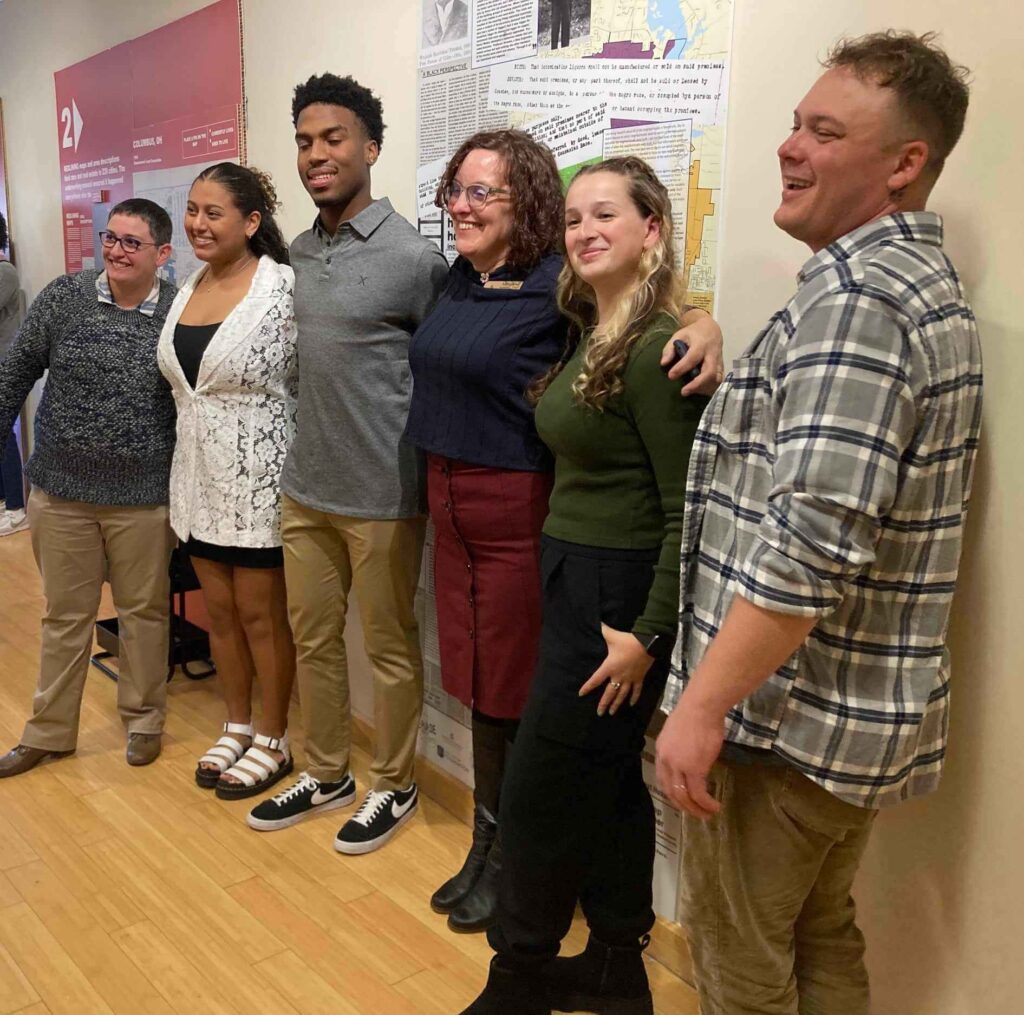Professors and High School Students Research Structural Racism for Traveling Exhibit
Posted Nov 22, 2023
Otterbein University, in collaboration with the Westerville Public Library, is hosting a traveling interactive exhibit called “Undesign the Redline.” The exhibit allows viewers to explore the history of structural racism caused by the 1938 redlining maps and delve into how this inequality continues to impact our communities today, focusing on the ways in which we can come together to “undesign” these systems with intentionality.
YWCA Columbus, along with several local partners, initially brought “Undesign the Redline” to Columbus in 2022 to complement its Activists and Agitators event, which explored the history of structural racism caused by the 1938 redlining maps — and how this inequality continues to impact our communities today. For more than a year, it has traveled to several of Columbus’ recreation centers, libraries, galleries, and universities in neighborhoods throughout Columbus, inspiring residents to learn together and work toward equitable housing solutions.
When Otterbein English Professor Margaret Koehler saw the exhibition, she knew it had value for her students. “I visited the project at the Linden Rec Center last spring and was deeply moved by it. And then I found out from Glennon Sweeney at the Kirwan Institute that the exhibition was available to central Ohio suburbs as well. I worked with Westerville Public Library and History Museum to partner with Otterbein in bringing the exhibit to Westerville.”
Systemic challenges today, like inequalities in housing, education, income, criminal justice, and health are far from separate issues. These challenges are rooted in a deep and entangled history of policies, practices, and processes that remain hidden and misunderstood.

“Undesign the Redline” explores these challenges, reframes them as opportunities, and grounds discussions about race, wealth, opportunity, and power in an honest context that is not about guilt and blame.
For those reasons, the exhibition aligns with a broad range of disciplines.
“The exhibit aligns closely with an Integrative Studies course that education nonprofit Erase the Space co-founder (and Olentangy High School English teacher) Derek Burtch and I teach called The Problem We All Live With: Race, Education, and Segregation in Central Ohio and Beyond,” Koehler said.
Associate Professor of History Anthony DeStefanis also became involved with the project, finding that “Undesign the Redline” illustrates many of the themes in his courses. “Along with Margaret, Derek, and Glennon Sweeney, I am part of Martha Holden Jennings Grant and American Bar Association grants that are aimed at researching the history of racial segregation in central Ohio,” he said. “This work aligns with several courses that I teach: HIST 2400: The Making of Modern America; HIST 3800: Immigration, Race, and Ethnicity; HIST 4450: The African American Civil Rights Movement; and a new course I will teach for the first time in fall 2024 on African-American history.”
“Undesign the Redline” is created in such a way that it can be localized. It allows everyone to contribute value to the design and development of new projects, partnerships, and decisions that seek to transform communities and move beyond the challenging – and often clouded – situation of our entangled past.
Koehler and others met weekly with a group of Westerville Central High School students who have researched local Westerville history connected to education, development, and racial inequality.
“Together with the Westerville high school students, we created a Westerville panel to add to the exhibit. That panel is currently on display in the Stichweh Gallery along with the rest of the exhibit,” Koehler said. “In December we’ve also been invited to bring the panel to a Westerville School Board meeting.”
“Undesign the Redline,” including the Westerville panel, can be viewed through Dec. 17.
- Location: Otterbein University’s Stichweh Gallery
- Address: 33 Collegeview Road, Westerville, OH
- Hours: Monday-Sunday, 9 a.m.-9 p.m.
- Presented in partnership with Margaret Koehler, English Professor at Otterbein University and YWCA.
The “Undesign the Redline” exhibit travels nationally to cities, towns, and communities. It has been localized for Columbus by a committee of local experts and historians, and it will be here in 2023 so that we can learn together, activate, and mobilize into a strong “we” capable of transformation